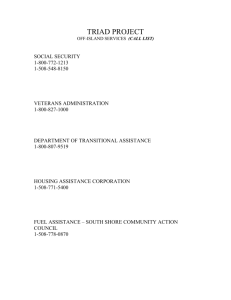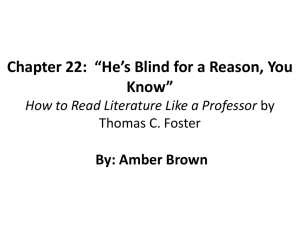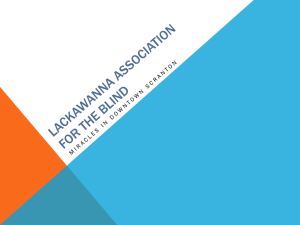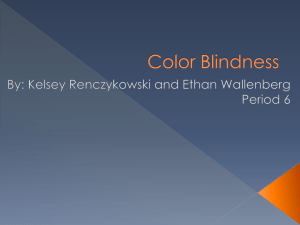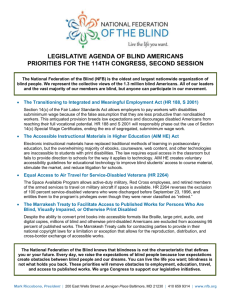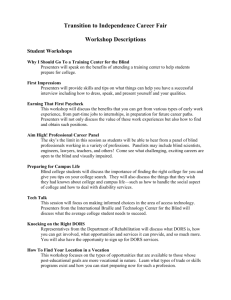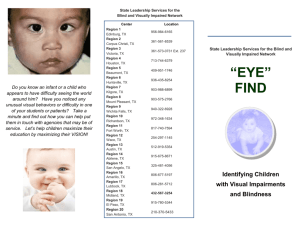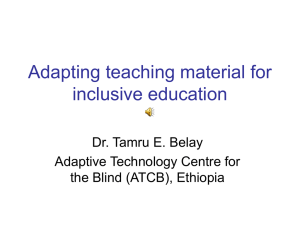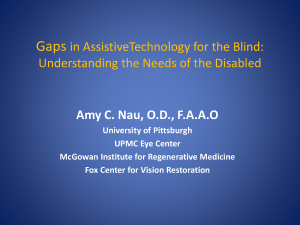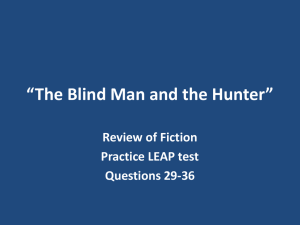the baleful tale of blind freddy
advertisement
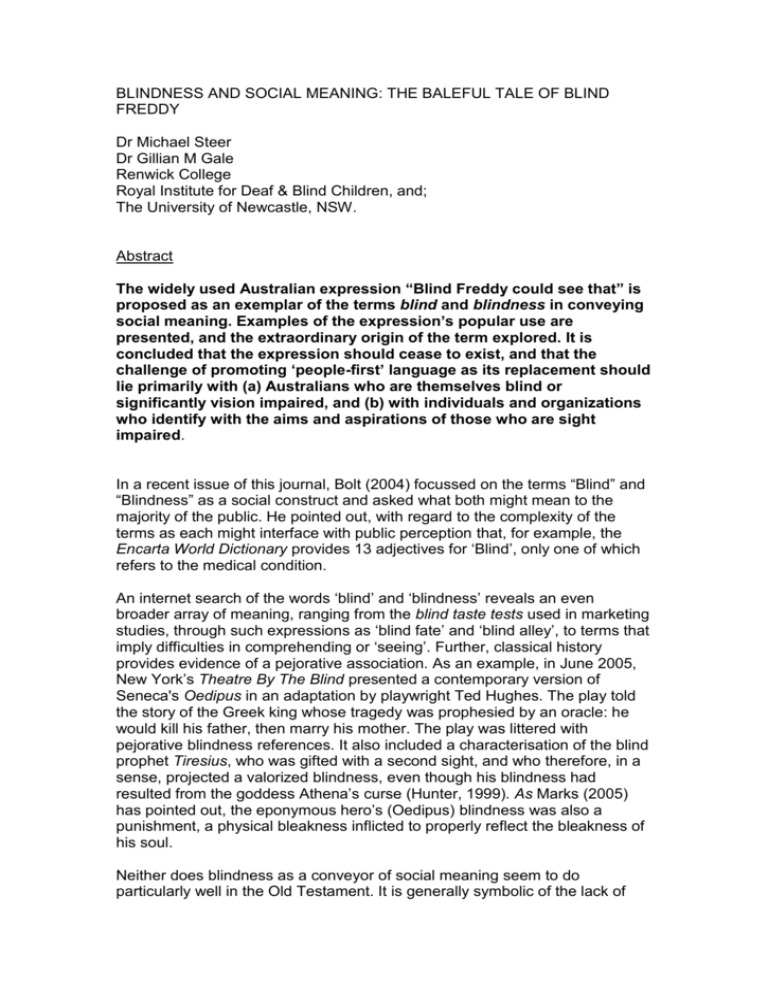
BLINDNESS AND SOCIAL MEANING: THE BALEFUL TALE OF BLIND FREDDY Dr Michael Steer Dr Gillian M Gale Renwick College Royal Institute for Deaf & Blind Children, and; The University of Newcastle, NSW. Abstract The widely used Australian expression “Blind Freddy could see that” is proposed as an exemplar of the terms blind and blindness in conveying social meaning. Examples of the expression’s popular use are presented, and the extraordinary origin of the term explored. It is concluded that the expression should cease to exist, and that the challenge of promoting ‘people-first’ language as its replacement should lie primarily with (a) Australians who are themselves blind or significantly vision impaired, and (b) with individuals and organizations who identify with the aims and aspirations of those who are sight impaired. In a recent issue of this journal, Bolt (2004) focussed on the terms “Blind” and “Blindness” as a social construct and asked what both might mean to the majority of the public. He pointed out, with regard to the complexity of the terms as each might interface with public perception that, for example, the Encarta World Dictionary provides 13 adjectives for ‘Blind’, only one of which refers to the medical condition. An internet search of the words ‘blind’ and ‘blindness’ reveals an even broader array of meaning, ranging from the blind taste tests used in marketing studies, through such expressions as ‘blind fate’ and ‘blind alley’, to terms that imply difficulties in comprehending or ‘seeing’. Further, classical history provides evidence of a pejorative association. As an example, in June 2005, New York’s Theatre By The Blind presented a contemporary version of Seneca's Oedipus in an adaptation by playwright Ted Hughes. The play told the story of the Greek king whose tragedy was prophesied by an oracle: he would kill his father, then marry his mother. The play was littered with pejorative blindness references. It also included a characterisation of the blind prophet Tiresius, who was gifted with a second sight, and who therefore, in a sense, projected a valorized blindness, even though his blindness had resulted from the goddess Athena’s curse (Hunter, 1999). As Marks (2005) has pointed out, the eponymous hero’s (Oedipus) blindness was also a punishment, a physical bleakness inflicted to properly reflect the bleakness of his soul. Neither does blindness as a conveyor of social meaning seem to do particularly well in the Old Testament. It is generally symbolic of the lack of moral and intellectual light (Hunt, 1984). The Judeo-Christian scriptures abound with stereotypic examples of blindness used as a tool of affliction by the God of the Old Testament on those who had offended Him or His chosen people. The New Testament provides examples of Christ healing the blind, as though blindness was an affliction that could be cured. There are in it, also references to the affinity of blindness with notions of helplessness. For example, Matthew 15:14 states “Let them alone: they be blind leaders of the blind. And if the blind lead the blind, both shall fall into the ditch”. There seems little comfort for our blind fellow citizens with regard to the psychosocial implications of their particular disability in the majority of these scriptural references. The terms “Blindness” and “Blind” have typically been regarded over the centuries, Bolt (2004) suggests, as words that convey notions of psychosocial burden. To this proposition might be added Kant’s assertion that "Thoughts without content are empty, intuitions without concepts are blind." (Sorter, 1979). Blind Freddy With this broad array of meaning as the basis for using the terms Blind and Blindness in ordinary speech, it is sobering to refer to the commonly used Australian expression “Blind Freddy could see that”, as perhaps synthesizing the everyday meaning of Blindness in the Land Downunder. This archetypical ‘put-down’ of those among us who are blind, used as a ‘throw-away’ line in ordinary, everyday conversations across Australia, and often still used on Australian radio or TV, conveys a sense that those who are Blind are also unable to “see” or understand what is happening around them, or what is being assumed or implied; in fact that Blind Freddy is unintelligent, and therefore, those who are blind also fall into that category. As examples of the term’s wide use in Australia, a Blind Freddy Trend is a term commonly employed on the Australian stock market to describe a strong (or runaway) trend; one that even "Blind Freddy" could spot (Incredible Charts, 2005). Further, Blind Freddy is the stage name of a relatively popular Canberra-based Blues band, while the good citizens of Sydney’s Fairfield suburb, in a public attack on Federal Government plans to build a new international airport near their homes, listed 12 discrete reasons why Blind Freddy could see that the proposal would not solve Sydney’s airport problems (FRAAN, 2000). As further examples; in November 2002, the Australian Press quoted the barrister for Ivan Milat (the infamous Backpacker Murderer) as saying "Blind Freddie could see that someone in the Milat family murdered seven backpackers", while in June that year, a headline in one of Melbourne’s leading newspapers trumpeted "Blind Freddie can see why house prices soared (Marx, 2004). Marx (2004) has further reported that The Business Council of Australia (www.bca.com.au) has added economics to Freddy's list of credentials by claiming, "Blind Freddy can see that the Australian tax system needs a major overhaul", while a former NSW state minister for transport seemed to suggest that Fred would make a fine ferry captain when he told State Parliament that "Blind Freddy could drive the River Cats (sic. catamarans) down Parramatta River" (NSW Legislative Assembly Hansard, November 19, 1993, article 21). The first Blind Freddy? History reveals that the original “Blind Freddy” was Sir Frederick Pottinger, Inspector of Police for New South Wales in the 1860’s (Hocking, 2004). Pottinger was officer in charge of the Lachlan (NSW) District during the reign of the infamous Bushranger “Wild” Ben Hall. The Bushranger was arrested for robbery under arms by Pottinger in April 1862. After four or five weeks in the “lock-up” Hall was released for lack of evidence. He was again, almost immediately arrested and spent another six or seven weeks in the “lock-up” at Forbes. He was once again released for lack of evidence. On returning home he discovered that his house had burned down and all his stock were dead. Further, while he was away his young wife had run off with another man. Wild Ben then embarked on a life of crime. His success in eluding capture scored Pottinger the nickname "Blind Freddy" among his peers and the journalists of the day In 1865, Sir Frederick was recalled to Sydney and charged with neglecting his duty. He had apparently attended a gentleman’s race at the Wowringragong Race Track, and was totally unaware that the men he was supposed to be arresting were there on the course as well. He had simply not taken any notice of the people in the crowd. After the enquiry into his negligent behaviour, Pottinger resigned. He was heading towards Sydney to seek redress, when he died, aged 34, from a bullet from his own pistol that he was carrying in his pocket. As a result, he was subjected to such public ridicule that the derisive term “even Blind Freddy could see it” was coined. What should we done about Blind Freddy? The original Blind Freddy having, almost 150 years ago shot himself, perhaps the time has at last arrived, without lament, to bury him. Language, as the American sociologist Wolfensberger pointed out in the 1960’s is a powerful means of conveying images about people (Wolfensberger, 1992). Blind Freddy as a metaphor conveys distinctly pejorative overtones, implying a foolish or willful overlooking of facts that are plain for all to see (Olson (2004). This is not good for those who struggle with literal vision impairments; since there is scant reason to think the majority of Australians who are blind any less keen on apprehending truth than the rest of us, or any less capable of applying sound judgment to the truths they apprehend. It seems to the authors that the task of burying Blind Freddy should lie primarily in the hands of (a) Australians who are themselves blind or significantly vision impaired, and (b) in the hands of the individuals and organizations who identify with the aims and aspirations of those who are sight impaired. Resolving the issue is primarily a matter of public education. Whenever this pejorative term is used, we in Australia, the individuals and agencies affronted by its use, should strenuously and noisily object. Our language has the power to inspire, motivate and uplift people. It also has the power to hurt, isolate and oppress individuals or entire segments of society. During the past several decades we have gradually changed our language and the way we refer to individuals and minority groups, to avoid further oppressing them. The 21st century is certainly not too late to reshape our language once again so that we refer to people who are blind or vision impaired in a respectful and more societally inclusive manner. References Bolt, D. (2004). Terminology and the psychosocial burden of blindness. British Journal of Visual Impairment, 22(2), 52-54. FRAAN (2000). Fairfield residents against airport noise. Retrieved 20 July 2005 from www.homestead.com/badgerysacpnp/files/Olympics2000.htm Hocking, G. (2004). Kings of the road: Currency lads and flash coves. Waverton, NSW: Waverton Press. Hunt, C. C. (1984). Masonic concordance of the Holy Bible. Bloomington, IL: The Masonic Book Club. Hunter, J. (1999). Tiresias. Retrieved 19 July 2005, from: www.pantheon.org/articles/t/tiresias.html Incredible Charts. (2005). Blind Freddy trends. Available 18 July 2005 from: www.incrediblecharts.com/ technical/blind_freddy_trends.htm Marks, L. (2005). Oedipus. Available 18 July 2005 from: www.nytheatre.com/nytheatre/oedi1876.htm Marx, J. (2004). Gift of sight. Radar. Retrieved 18 July 2005 from http://radar.smh.com.au/archives/2004/11/gift_of_sight.html Olson, W. (2004). Kingdom of the one-eyed man. Reasononline. Available 18 July, 2005 from: http://reason.com/9807/col.olson.shtml Sorter, G.H. (1979) Beyond emptiness and blindness: Is there a hope for accounting research? The Saxe lectures in Accounting. Available 18 July 2005 from: http://newman.baruch.cuny.edu/digital/saxe/saxe_1978/sorter_79.htm. Wolfensberger, W. (1992). A brief introduction to social role valorization as a high-order concept for structuring human services. (rev.ed.). Syracuse, NY: Training Institute for Human Service Planning, Leadership and Change Agentry, Syracuse University.
